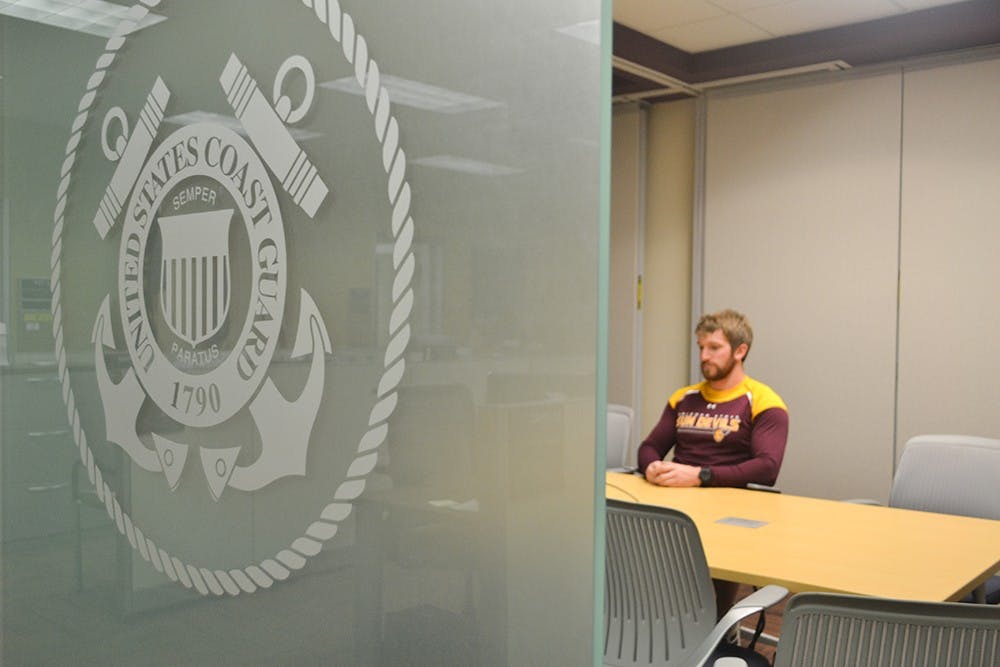Veterans at ASU, specifically those currently working in the Pat Tillman Veterans Center in the Memorial Union, are using the post-9/11 GI Bill benefits to pursue their degrees.
For those who served after Sept. 10, 2001 — during and after the terrorist attacks that killed nearly 3,000 people in New York, Pennsylvania, and Washington D.C. — military members are provided education benefits like tuition and fee scholarships as well as a monthly housing allowance.
In order to receive the maximum amount of the education benefit program, veterans must have served for at least 36 months, or for at least 30 continuous days with a discharge due to a service-connected disability, according to the Post-9/11 GI Bill VA pamphlet.
Engineering major Justin Blommer, who served in the Marine Expedition Unit, an expeditionary reaction force, is currently pursuing an undergraduate degree in biomedical engineering.
“I knew a little bit about (the post-9/11 GI Bill) when I went in, but it didn’t really have anything to do with why I joined,” Blommer said. “It was completely irrelevant at the time.”
Blommer was originally going to use the Montgomery GI Bill, available for those who enlisted in the U.S. Armed Forces. But he switched to the post-9/11 GI Bill after speaking to the education counselors on the base, he said.
His experience in the military gave him more maturity, which urged him to take school more seriously, he said.
Originally from Minnesota, Blommer was looking to attend ASU before deciding to enlist. The majority of people he served with went straight to work, but Blommer wanted to get his degree.
The post-9/11 GI Bill has made the transition between the military and school stress-free, he said. Not only does the GI Bill provide education benefits, but it also includes a monthly housing allowance.
Although Blommer still needs to work part-time at the Pat Tillman Veterans Center to “make ends meet,” he said he enjoys being a liaison between the school, veterans and the Veterans Administration.
“It takes the financial burden off of (school), which, coming out of the military, was a huge thing for me and a whole lot of guys,” Blommer said.
Education graduate student Matt Schmidt is also using his post-9/11 GI Bill benefits for his degree.
In fact, this is the second master’s degree he is pursuing using the GI Bill benefits.
After obtaining an undergraduate degree in journalism, he enlisted in the Coast Guard and worked as a helicopter rescue swimmer from 2005 to 2009.
When learning about the post-9/11 GI Bill, the information was “basically thrown at” him in a single day at the end of his service with the Coast Guard.
“I didn’t retain much of what I learned,” Schmidt said. “But I did know, going into the Coast Guard, that I would have education benefits available to me. So I just looked into it myself."
Schmidt went on to pursue an MBA from the University of Missouri using the GI Bill to cover his tuition and fees.
After that, he decided to move to the West coast, and then to Arizona.
Although Schmidt’s background was in marketing and management, he decided that he wanted to apply those skills to the higher education sector.
“ASU was known as a military-friendly school,” he said. "As someone who’s interested in the management of higher education institutions, I thought this would be a good place for me to be to learn about the military environment in an innovative community.”
While Schmidt is using his GI Bill benefits for his master’s degrees, he pointed out that there are other ways to use the benefits as well.
Veterans can use the post-GI Bill benefits for different types of training at colleges, universities, trade schools, on-the-job training, apprenticeships and flight schools, according to a post-9/11 GI Bill pamphlet.
“There are still a lot of veterans (who) don’t take advantage of the benefits,” Schmidt said. “It doesn’t mean that you have to go to college … it’s an opportunity I hope people don’t take for granted and I hope more military members use it.”
Peter Valenzuela, a Navy veteran pursuing an undergraduate degree in urban planning, enlisted for the opportunity to travel and the sense of obligation to serve. After being honorably discharged, Valenzuela was excited about going to college. However, he was also nervous because he was married and had kids, which left a lot of uncertainty involved.
The post-9/11 GI Bill quelled some of this uncertainty with its tuition assistance and housing allowance.
Valenzuela switched from a landscape architecture major to urban planning because he will be able to continue using his benefits for his master's degree in the future.
“I have a greater respect for education since the military has trained me to be more disciplined,” he said. “I never would’ve been able to go to college without (the GI Bill)."
Related Links:
Muslim-American student group commemorates 9/11 with memorial wall, bracelets
Phoenix 9/11 Memorial honors fallen emergency personnel
Reach the reporter at jenny.ung@asu.edu or follow @Jenny__Ung on Twitter.
Like The State Press on Facebook and follow @statepress on Twitter.




